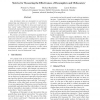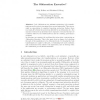18 search results - page 1 / 4 » Deobfuscation: Reverse Engineering Obfuscated Code |
WCRE
2005
IEEE
13 years 10 months ago
2005
IEEE
In recent years, code obfuscation has attracted attention as a low cost approach to improving software security by making it difficult for attackers to understand the inner worki...
CCS
2008
ACM
13 years 6 months ago
2008
ACM
While many obfuscation schemes proposed, none of them satisfy any strong definition of obfuscation. Furthermore secure generalpurpose obfuscation algorithms have been proven to be...
CCS
2007
ACM
13 years 11 months ago
2007
ACM
Despite the recent advances in the theory underlying obfuscation, there still is a need to evaluate the quality of practical obfuscating transformations more quickly and easily. T...
IWPC
2007
IEEE
13 years 11 months ago
2007
IEEE
Java developers often use decompilers to aid reverse engineering and obfuscators to prevent it. Decompilers translate low-level class files to Java source and can produce “good...
ISW
2004
Springer
13 years 10 months ago
2004
Springer
Abstract. Code obfuscations are semantics-preserving code transformations used to protect a program from reverse engineering. There is generally no expectation of complete, long-te...


